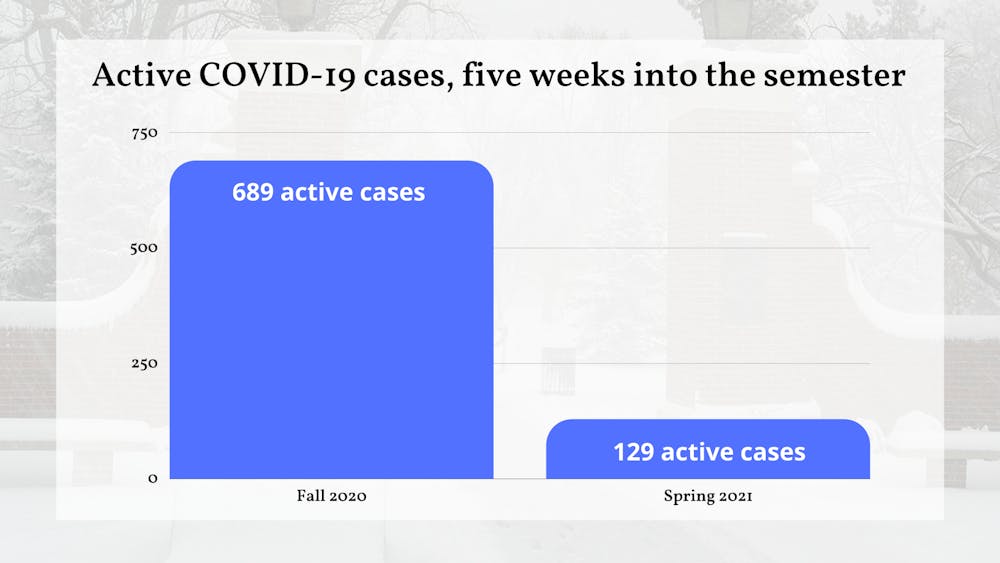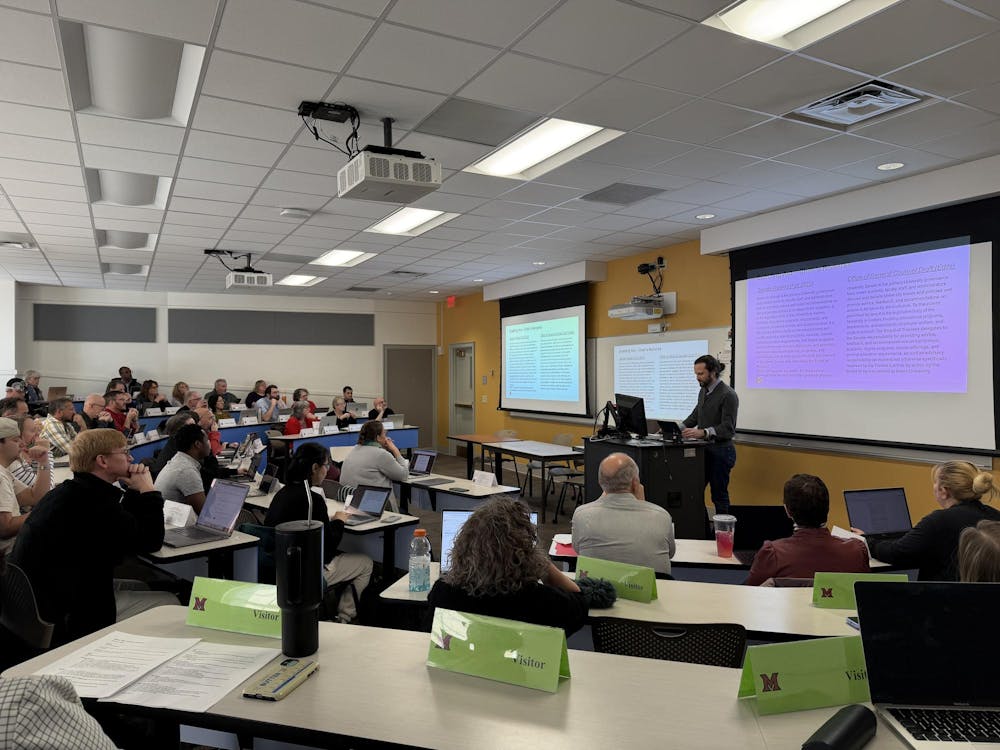Although the current number of active COVID-19 cases is still considerably low compared to this point last semester, Miami University’s active COVID-19 cases are beginning to rise after a period of downward trends.
At this point last fall, the university was experiencing 689 active cases. Miami’s COVID-19 dashboard currently shows only 129 active cases at this time, with 3 new cases reported on Feb. 28. However, Miami’s Associate Director for University News and Communication Carole Johnson wrote in an email that recent testing saw an uptick in positivity rates.
“Last week we saw about a 2% positive rate in our saliva testing in our surveillance data,” Johnson wrote. “This is compared to .5% to 1% positive rates that we had been seeing since the beginning of this semester. We are also seeing more people coming in for testing due to symptoms, and those positive results are rising as well.”
Before the recent increase in cases, the university’s dashboard had seen a downward trend in active cases, matching statewide data.
Hahne and Brandon are the only residence halls classified as level four purple so far this year, and as of March 1, Brandon is the only residence hall currently above a level two status.
“Good job, Miami!” Miami’s COVID Response Team wrote in a Feb. 17 email to students, celebrating a positivity rate under 1%.
The Centers for Disease Control and Prevention (CDC) has estimated that confirmed COVID-19 cases in the U.S. represent only a quarter or less of actual infections.
Hypothetically, if Miami’s cases reflected this national estimate, it would mean upward of 11,000 students out of the approximate 14,500 living in Oxford have been previously infected.
Estimates like this and recent downward trends have prompted people to think about the possibility of herd immunity.
While that prospect has floated around the public psyche for several months, Miami’s COVID-19 testing team doesn’t entertain it as a solution.
“Herd immunity is not a strategy,” wrote the team, led by Steve Large, Dana Cox and Gwen Fears in an email to The Miami Student.
The team also said national trends are not indicative of what will happen at Miami.
Enjoy what you're reading?
Signup for our newsletter
“We are always at least somewhat insulated from state and national trends because we are a relatively self-contained college campus in a small city,” the team wrote. “The measures we take on campus have a much greater effect on our transmission rates than what is going on more broadly in the state and nation.”
“Our testing program is more robust than in fall 2020,” the team said in regard to both the number of tests done with surveillance testing, and the time tests are processed in.
The improvements haven’t gone unnoticed by students, but feelings about the virus’ campus presence are still mixed.
“For me, personally, it is reassuring to know that there are less cases,” said Alex Danciutiu, a junior pre-medical studies and bioengineering double major.
First-year nursing major Abby Green said the low numbers don’t put COVID-19 out of her mind.
“I think that there’s a level of stress that [COVID-19] kind of creates for everybody,” Green said.
Danciutiu and Green both reported being tested more often than last semester, and Danciutiu said all her friends have, too.
“From what I’ve talked about with all my other friends, there does seem to be an influx of testing this semester as opposed to last semester,” she said.
Danciutiu said she’s been tested four times this semester. Her only reservation about the new strategy is the lack of notification for negative test results.
Danciutiu works at Fort Hamilton Hospital and often finds herself wishing she was able to prove her negative status for the medical work environment.
“I’d just like to have the proof if they ever, like, ask me if I do have any coronavirus symptoms or contact. I can just pull that up and say ‘Oh, two days ago I was tested and it came back negative.’”
Some students are exempt from worries of testing and contracting the virus, like first-year marketing major Mike Barnes, who tested positive over winter break.
Barnes submitted his results to the university through Med+Proctor and was cleared from testing for 90 days. While he hasn’t taken part in testing this semester, Barnes said he feels good about this semester’s trend.
“[It] shows the university’s policies have helped make an improvement,” Barnes said.
Dean of Students Kimberly Moore warned against letting the low numbers give way to irresponsibility.
“I am cautiously optimistic about the low case count,” Moore said. “I ask that students continue to be caring and conscious when it comes to protecting themselves and their community.”
Moore said students should continue to take precautions when interacting and take symptoms seriously.
“Very importantly, I ask students to visit the Student Health Center if they develop symptoms of COVID-19 to be tested,” Moore said. “Ignoring symptoms and avoiding testing is the quickest way to thwart our progress.”




